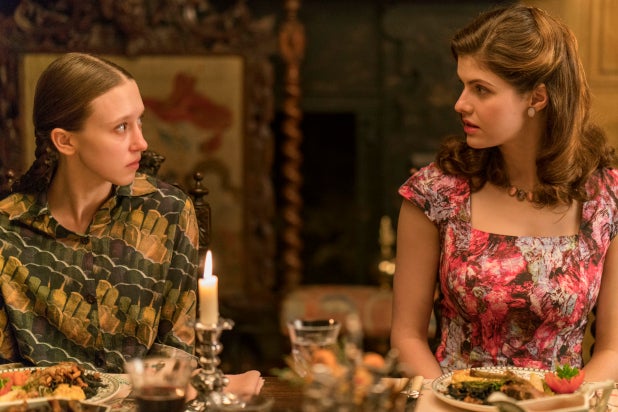'We Have Always Lived in the Castle' Film Review: Sisters Hide From the World in Riveting Shirley Jackson Adaptation - thewrap
www.thewrap.com- May 17,2019

Brainstorm Media
In Stacie Passon’s dynamic directorial debut “Concussion” (the lesbian one, not the Will Smith one), a housewife breaks free of her suburban bubble by taking on sex work in the city. With her sophomore feature “We Have Always Lived in the Castle,” adapted by Mark Kruger from the 1962 novel by Shirley Jackson, Passon offers a female protagonist who’s the antithesis of her previous one: Merricat Blackwood (Taissa Farmiga) can’t ensconce herself enough from the world outside.
(The heroine of “Concussion” spends most of the film renovating a Manhattan apartment, while Merricat builds her entire world within the walls of the family manse, meaning that someday, someone is going to craft a thesis with a title like “Inquire Within: Real Estate in the Films of Stacie Passon.”)
While this period adaptation sees the filmmaker operating in a more traditional, classical mode, “We Have Always Lived in the Castle” allows Passon to work with a larger, more complex canvas while still displaying her intuitive understanding of women seeking to overthrow repression and societal expectation. There’s a gothic tone at play here — imagine “To Kill a Mockingbird” if Scout were more like Boo Radley — but the film always puts us squarely on the side of Merricat and her fragile older sister Constance (Alexandra Daddario, “Baywatch”).
Also Read: 'American Horror Story': Taissa Farmiga Explains Tate and Violet's 'Return to Murder House' Ending
The Blackwood sisters have been the subject of gossip and malice from the nearby townspeople ever since the tragic death of their parents in a poisoning incident that left their uncle Julian (Crispin Glover) confined to a wheelchair. (Constance was cleared of the murder, but the locals suspect her nonetheless.) Julian spends his days obsessively writing his memoirs, while Constance has agoraphobically confined herself to the estate’s grounds ever since her cruel father sent off her most ardent suitor. That leaves Merricat to go into town once a week for supplies, and the intense young girl (Farmiga rarely blinks) constantly buries totems in the yard to keep the family safe.
Her spells do nothing to prevent a visit from dashing cousin Charles (Sebastian Stan), a slick character with a red sports car whose arrival upturns the fragile household. It’s clear that he’s interested only in the family fortune, locked up in an upstairs safe, but Constance is so starved for attention and guidance that she crumbles under his patriarchal charms. Before the story is over, there will be revelations, vengeance, and — because this is a Shirley Jackson tale — at least one angry mob.
Watch Video: Which 'Captain America: Civil War' Star Knows All the Words to 'The Little Mermaid'?
Cinematographer Piers McGrail (BBC’s “Little Women”) never overplays his haunted-house hand — the sun shines through the windows of the Blackwood estate and in the town, even when dark deeds and intentions are playing out. It’s only when Merricat hides out in the woods that the lighting and the atmosphere become externally sinister; the rest of the time, the film offers a fascinating contrast between its visuals and its themes.
As she did with “Concussion,” Passon takes talented actors and finds new and compelling facets to their abilities. From Daddario’s increasingly strained smiles (for Constance, everything is fine and will be fine and must be fine) to Stan’s preppy villainy to Glover’s doddering obsessiveness, the central performances are riveting. It’s Farmiga’s show all the way, though; Merricat narrates early on that she is 18, but there’s a pubescent terror and fury to the character, like a Bad Seed who’s just started junior high.
Also Read: 'San Andreas' Sequel Greenlit: Dwayne Johnson, Alexandra Daddario and Carla Gugino Expected Back
The performances are buttressed by a production that subtly underscores the intentions of both the characters and the plot, from the costumes by Eimer Ni Mhaoldomhnaigh (“Love & Friendship”) to the score from Andrew Hewitt (“The Stanford Prison Experiment”), which coax the film along to where it’s going without ever being too obvious about it.
In a way, “We Have Always Lived in the Castle” has the feel of the Broadway musical or HBO version of “Grey Gardens,” or even of an old story song like “Delta Dawn,” providing the backstory for what made the neighborhood eccentric into a recluse who frightens children. Passon, like Jackson before her, feels real compassion for these misunderstood women and understands why keeping a cruel world at bay might be their best defense.
Click here to See Full article

